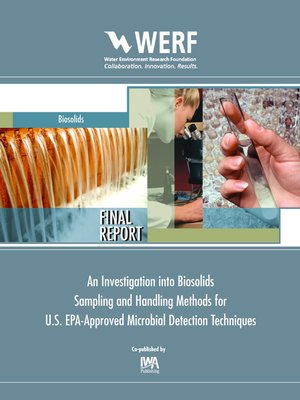An Investigation into Biosolids Sampling and Handling Methods for U.S. EPA-Approved Microbial Detection Techniques
ebook ∣ WERF Research Report
By Sharon C. Long

Sign up to save your library
With an OverDrive account, you can save your favorite libraries for at-a-glance information about availability. Find out more about OverDrive accounts.
Find this title in Libby, the library reading app by OverDrive.



Search for a digital library with this title
Title found at these libraries:
| Library Name | Distance |
|---|---|
| Loading... |
The objective of this research was to develop guidance for collecting samples of biosolids for microbial analysis to ensure representative samples are tested. The types of biosolids products studied included liquid, cake and compost. To accomplish the research objective, three phases of research and development of a suite of communications documents were undertaken.
The first Phase involved information gathering and establishing the status of sampling guidance and practices for biosolids. Phase II involved conducting sampling and microbial analysis of biosolids products from four target facilities utilizing different biosolids treatment technologies to determine which of a series of sample collection and handling parameters most affects sample integrity and representativeness. Phase III of the project involved field testing at nine utilities. Microbial monitoring results were compared and utility protocols were examined to determine the suitability of their sampling approach. Finally, a series of communications documents were prepared.
These communications tools were designed to convey the importance of sampling and handling details at multiple stakeholder levels. This research demonstrated that analysis of multiple, discrete, grab samples provides insight into product variability. In addition, proper handling and adherence to sample size and storage protocols provides a reliable measurement of biosolids microbial content from the biosolids production process being sampled.
The first Phase involved information gathering and establishing the status of sampling guidance and practices for biosolids. Phase II involved conducting sampling and microbial analysis of biosolids products from four target facilities utilizing different biosolids treatment technologies to determine which of a series of sample collection and handling parameters most affects sample integrity and representativeness. Phase III of the project involved field testing at nine utilities. Microbial monitoring results were compared and utility protocols were examined to determine the suitability of their sampling approach. Finally, a series of communications documents were prepared.
These communications tools were designed to convey the importance of sampling and handling details at multiple stakeholder levels. This research demonstrated that analysis of multiple, discrete, grab samples provides insight into product variability. In addition, proper handling and adherence to sample size and storage protocols provides a reliable measurement of biosolids microbial content from the biosolids production process being sampled.







